The Monogatari Series is an experience.
I don’t just mean that in the, “Oh, it’s such an emotional journey!”, kind of way. It is, but it is also so much more.
Your dose of Monogatari analysis!
The Monogatari Series is an experience.
I don’t just mean that in the, “Oh, it’s such an emotional journey!”, kind of way. It is, but it is also so much more.
All hail Shaft in its infinite wisdom…
With any video game adaptation of an already existing work, it’s real tough to figure out how the gameplay would work out! I would bet that even those of you who have heard of Higurashi never heard of its 3D fighter spinoff-
Yes, it’s exactly as bad as you would think. For some inexplicable reason, 3D fighters tend to be total crap! (like, anyone hear of the Touhou fighter for the Nintendo Switch)
So then, given that it’s a mobile game, it already clears that hurdle…
But what is the gameplay of ‘Monogatari Series Puc Puc’?
Well…
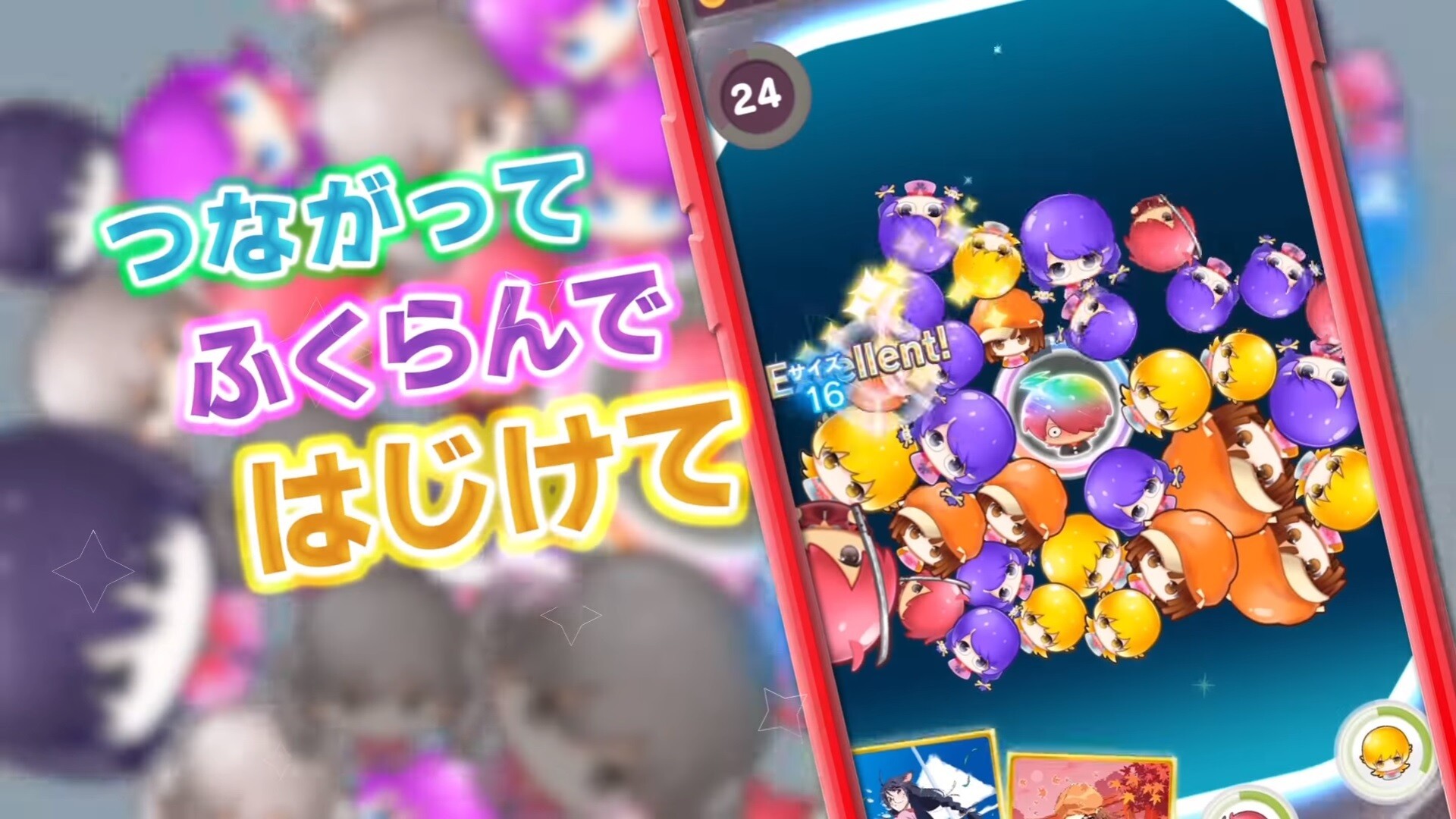
Yeah, it’s kinda like Candy Crush…
You just tap and drag heads in a connecting line to add up points…
Not exactly the most engaging gameplay! And it doesn’t exactly match the series in any specific way…
But hey! At least we finally got a bunch of the Monogatari girls singing the same song! (Besides Senjougahara and best gril’s collab)
And yes, I am so chronically addicted to this series that I can’t help looping the last 40 seconds of this OP. This game is mindless fanservice, through and through!
…
And I think that’s totally fine! Now I can proudly show my devotion to my favorite series in public! Also, I can grab a few Monogatari wallpapers!
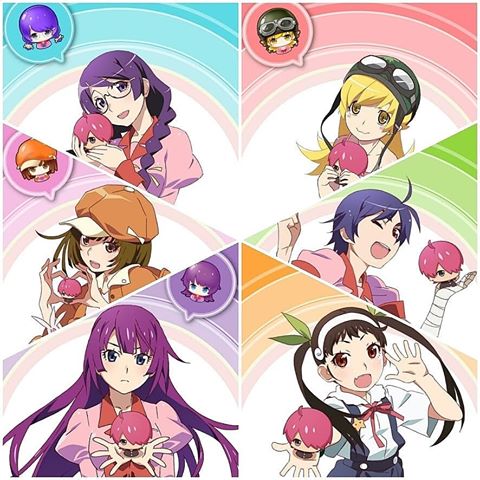
If you’re interested, here’s what I used to download the game -> https://news.qoo-app.com/en/post/32094/%5BQoo+News%5D+Monogatari+Series+Pucpuc+is+now+on+mobile?from=list_item
And uh… yeah, just wanted to spread the word about a fanservice game for Monogatari! (cause I’m not just the analysis guy)
Wow, we are at the Monogatari Series: Second Season already. Lucky for us there are still plenty openings to go through (I really need to think of something else Monogatari related to write about).
If you missed the last opening analysis, Perfect Slumbers, you can find it here. Both Chocolate Insomnia and Perfect Slumbers have a lot in common with the themes they choose and Hanekawa’s character.
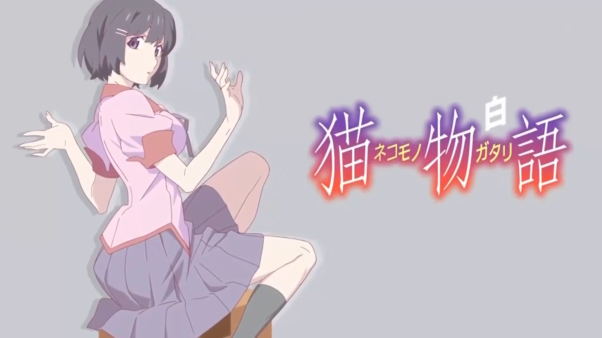
Chocolate Insomnia is the first opening featured in the second season (which is technically the third season? After Nisemonogatari?), during the segment we like to call Tsubasa Tiger. I haven’t actually watched the opening yet, so let’s take a look:
What a nice song, relaxing but also a little exciting.
From what I’ve noticed, there are two major themes to this opening:
So first let’s talk about the idea of waking up. I feel like this is a double entendre when you apply it to Hanekawa. First, the divider between Hanekawa and Black Hanekawa is sleep. Therefore, when Hanekawa wakes up she is no longer Black Hanekawa. Naturally, the “insomnia” portion of the song name applies to the opposite: when Hanekawa sleeps she becomes Black Hanekawa, and so she doesn’t actually “sleep”.
The second meaning that waking up has is in regards to Hanekawa herself. Hanekawa “wakes up” in Nekomonogatari: Shiro. Up until now, she has ignored and run away from her problems. Problems that stress her out, stress that piles up until Black Hanekawa is required to attempt to alleviate her stress. In Nekomonogatari: Shiro, we learn that the primary cause of stress for Hanekawa is her unrequited love for Araragi. Despite having countless chances to make a move and let him know, or move on, Hanekawa instead just maintained her feelings; which built up and caused her internal turmoil (even if she didn’t consciously realize or accept this fact). By finally confronting this issue and telling Araragi how she feels, she finally “wakes up”.
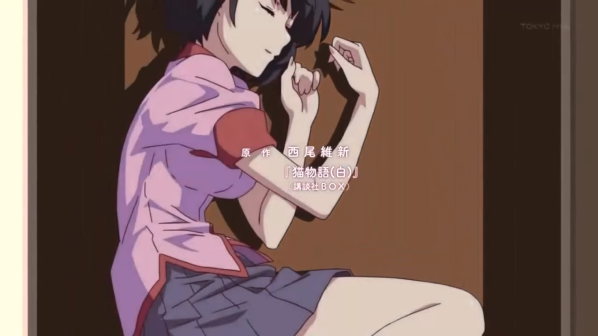
Chocolate. Why chocolate? It’s a tasty sugary treat that provides energy (although I actually read sugar doesn’t make people hyper or anything, it’s a placebo? Or something like this. Technically it still gives energy because it’s food though). So I think that part of it goes hand in hand with waking up. After all, who hasn’t had a muffin / sugary cereal / donut / pancakes w/ syrup / cinnamon bun for breakfast? Not to mention the amount of sugar consumed every morning by people through their coffee. Sure, none of that is chocolate, but it’s the same concept right? Society has a serious sugar problem apparently. But yeah, waking up, energy, there’s some relation there.
The other reason why I think chocolate was chosen was because then they can use both dark and white chocolate as symbolism for Hanekawa and Black Hanekawa. Or Nekomonogatari: Kuro, and Nekomonogatari: Shiro? 🙂 Either way, the two colours of chocolate would refer to Hanekawa in some way like this. Black Hanekawa technically has white hair, but I imagine black chocolate refers to Black Hanekawa. White chocolate would be regular Hanekawa, although I don’t think white chocolate plays a prominent role in the opening.
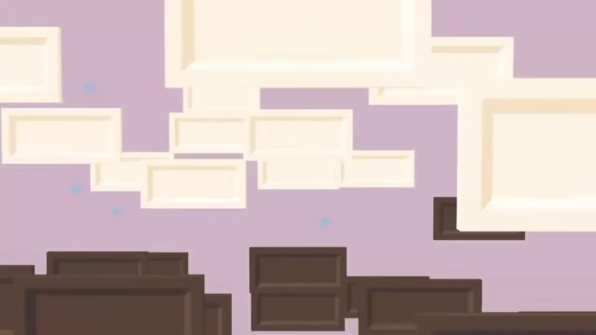
And that’s basically the premise of this opening; the overarching theme if you will. Waking up, energy, Black Hanekawa.
Now let’s finally get to looking at the actual opening. I feel like I’ve already explained the premise of the opening pretty well, so I’ll just point out some interesting scenes with symbolism in them instead of breaking down the entire opening scene by scene.
First scene I’d like to point out is Hanekawa sleeping inside of a cardboard box. Hanekawa sleeping is simply the opposite of her waking up. She is still running away from her personal problems and relying on Black Hanekawa. The box itself is interesting though. I believe in this situation the box equates to Hanekawa’s feelings, and how she boxes them up. It could also mean that Hanekawa needs to “think outside of the box” and take an action she normally wouldn’t, or something like this. Either way Hanekawa is in a box, so to speak.
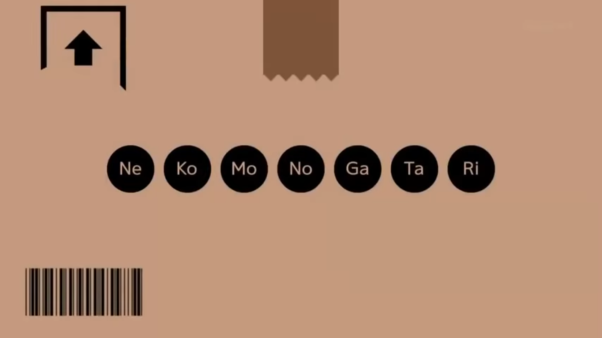
Next is Hanekawa and two little black cats doing radio calisthenics, which I believe is typically done in the morning? The scene plays off Hanekawa waking up, as well as Black Hanekawa (the cats) joining her. You could say that they both wake up in a way, once Hanekawa writes to Black Hanekawa asking for help.
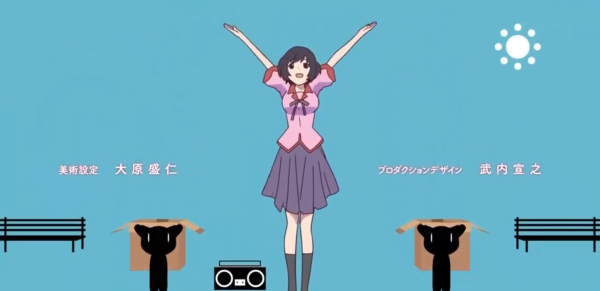
After this there is a scene of Hanekawa being carried by black cats. This would be representative of Black Hanekawa attempting to solve Hanekawa’s problems for her. Shouldering her problems, so to speak, as Hanekawa is unable / unwilling to solve them herself.
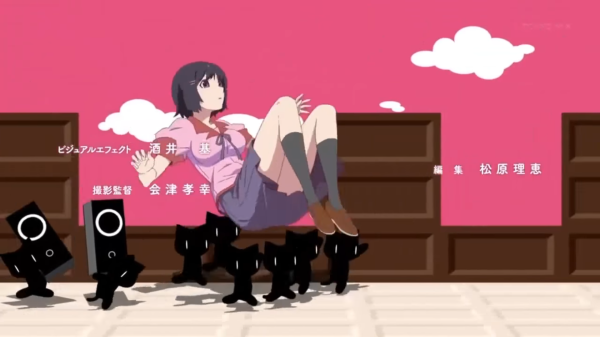
Then we witness Hanekawa eating a single chocolate. I’m going to guess that this chocolate is the trigger that “wakes her up”. A truth pill of sorts. This chocolate probably represents the moment when Hanekawa finally realizes that she needs to solve her problems herself, and stop hiding / running from them. Accepting Black Hanekawa, or accepting the reasons behind why Black Hanekawa is appearing. Something like this.
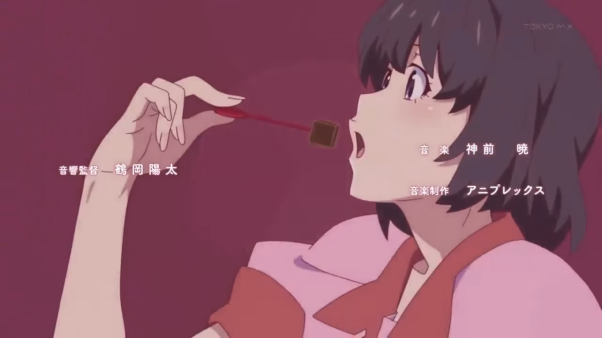
Hanekawa transforms after eating the chocolate. Growing a tail, cat ears, and her clothes changing into a white dress. I think this transformation is Hanekawa accepting herself / accepting reality. Just like how her hair permanently changes to have a white streak in the anime, Hanekawa changes.
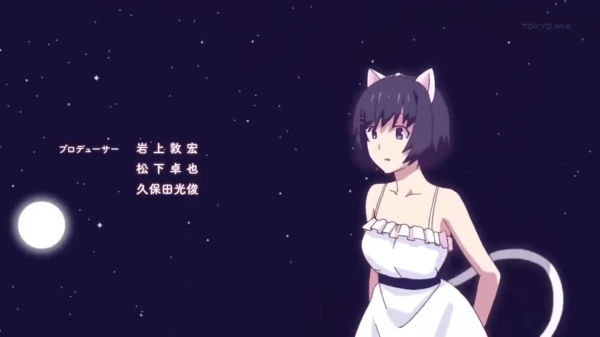
The final scene is of Hanekawa getting out of the box. No longer will she ignore herself, run away from her problems, or hide them from others. Hanekawa’s character has really changed, and she is no longer hiding / trapped in that box.

And that’s all for Chocolate Insomnia. We’ve seen a lot of Hanekawa lately in these openings, but this is the last of Hanekawa. Unless I’m forgetting something. I’m pretty sure this is the last Hanekawa opening though.
Hanekawa is an interesting character who gets a lot of screen time in the anime, and even becomes the main character in Tsubasa Tiger, the story linked to this opening.
Anyways, that’s it for this post.
Until next time.
Thanks for reading!
Here on EAT Monogatari, I’ve been slowly analyzing my way through each part of the Monogatari Series… And since I’m halfway through my analysis of ‘Suruga Monkey’, I am about halfway through Bakemonogatari. It’s easy to say that I’m counting my chickens before they hatch! Really, it is. But I’m fresh from a one-week writing hiatus, and I’m itching to write about what I watched- the final arcs of Monogatari! (Excluding the not yet released Zokuowarimonogatari)
With that in mind, I’d like to briefly summarize my thoughts on the thematic messages conveyed throughout Monogatari. But before I get to the themes, I would feel bad if I didn’t at least mention Monogatari‘s meta-narrative. While Monogatari‘s themes can and should be applicable to all people, they are especially relevant to those who are a part of otaku culture.

To an outside viewer, Monogatari seems to embody otaku culture. It appears to be a harem that has some of the most marketable waifu’s on the market… And its status as the best selling anime of the 21st century would seem to add weight to that view-
But the Monogatari Series, originally a series of light novels by Nisioisin before being adapted into an anime by Studio Shaft, was uniquely positioned to be the strongest refutation of generic harem anime and light novels. While most harem anime seem to advocate escapism from a boring life, Monogatari advocates a wholly different perspective.
Monogatari seeks to show how enjoyable life can be. And it shows how individuals can do that! The first season’s biggest takeaway is the difficulty and complexity of human interaction, that people have much more depth than the way in which they present themselves. Given the feeling that general human interaction isn’t “genuine” enough to that depth, the worst answer is to pull away. Interaction is not a one-way street!
And for that reason, Monogatari pushes that everyone judge everyone else as individuals. That’s the singular insight that harem series never want you to realize, that girls are people too…

But besides strictly meta interpretations, I would like to discuss Monogatari‘s evaluation of the self… In a totally frank manner. Forgetting Nietzsche, Freud, or even Jung, I want to talk in plain terms about how I perceive Monogatari as a sort of manual for living a fulfilled life. So, the first question that comes to mind is-
“What is an unfulfilled life?“
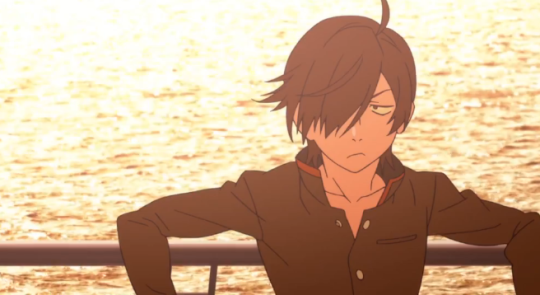
A hollow life without purpose. One of regret that can devolve into self-hatred.
“What are the consequences of an unfulfilled life?“
There are many. For the most part, with notable exceptions in Nisemonogatari, the supernatural represents singular urges and emotions removed from the self. While you might stop and wonder the circumstances in which singular emotions could ever produce real world consequences, you only have to look at how people react to crisis to understand.
Mothers risking their life to save their children, teens acting rebellious towards parents that they love and respect, parents hitting their children…

It’s not really all that unusual for circumstances to allow one aspect of a person to subsume everything else in the heat of the moment. Monogatari goes out of its way to show how even the smallest things can cause life-changing repercussions. It’s unfulfilled, self-hating people who will break under pressure.
“So then, how does a person become fulfilled?“
Well. First, why don’t we ask what is not fulfillment?
Against the proclamations of popular culture, other people will not fill the hole in your soul. It’s like Oshino Meme always says-

All anyone can ever do is save themselves. Like the metaphor about leading a camel to water, no one can ever impose real meaning on your life. Similarly, you can never give someone else’s life meaning. You can give someone else a method in which to find meaning, but given how complicated people are, it’s either an act of true courage or true ignorance to trust another person to that degree.
After exploring what meaning is not-
I must ask you to think of your values, morals and their likeness, and ask if you truly believe in them. Where does your faith come from? Experience? Family? Hearsay? Religion? In the end, the cause of your values is of much less importance than your perception of that cause…
For example, if your religion values veganism, but you feel that particular belief is archaic- and this is only when you truly feel that- then you would feel no guilt or shame in not following that specific value. The only determiner of value in one’s life is oneself! (Although we often lie to ourselves)
Betraying and living in contradiction to one’s beliefs causes shame, and that’s obviously why people should pursue values over happiness. And that’s one of the most interesting parts of Monogatari‘s philosophy for me.
“If people decide value, then why can’t happiness be a value.”

I struggled with this one a little, but here’s what I came up with-
Happiness can be a stated goal, sure. But don’t make that your life goal.
In vaguely chasing happiness or comfort as an “ends” rather than a fortunate byproduct in one’s presumably successful life, you can end up betraying your other values pretty easily. And then the guilt will cause a destructive spiral where you destroy more and more everything that you care about…
Ideally, to live the most fulfilled life possible, a person should try their absolute best to hold true to every value they legitimately care about. Individuals should try to succeed at everything they want to accomplish, and when there is contradiction between different values, try and evaluate which value is worth more.
This all became a bit vague…
But that brings me to a question that I find personally interesting-
“After all this talk about ‘truly believing‘ in values, how does one evaluate their values?“
This one was honestly… soul-crushingly tough for me to figure out. Given that people lie to themselves, how can one figure out what they really feel?
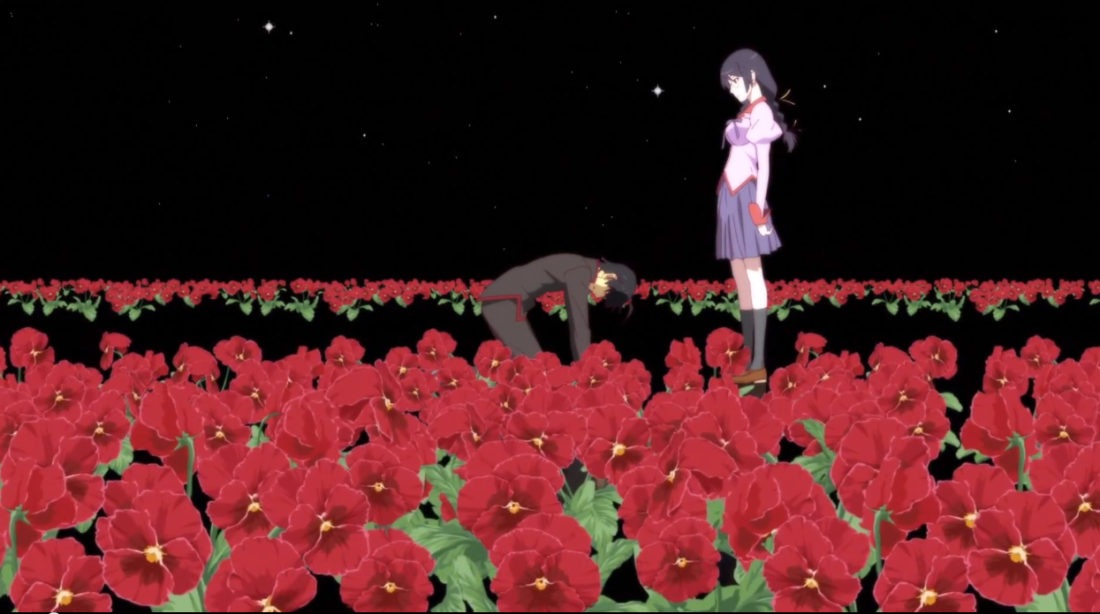
And the answer was… completely counter-intuitive! In a series full of individualism, the answer to such a key question eluded me! And that is because the answer is actually not insular. To really understand one’s values, a person can’t look at themselves or their explicit past.
In a story of individuals… the answer is other people. As much as people can only be saved by themselves, people are incapable of truly living without one another.
But let’s take a simple approach to understand my reasoning here. If you don’t want to be ashamed of your actions, then the reverse of that is wanting to be proud of your actions, correct? So then-
Isn’t an acceptable way of forming values watching all sorts of other people, and figuring out which values you admire? In an osmosis-like process of trial and error, many people learn which values are worth keeping from those around them…

But to bring this discussion of Monogatari full circle, couldn’t stories offer alternative values? As much as art imitates life, life imitates art. People can experience and learn through stories just as they can learn from people…
And now we find ourselves back at generic harem anime and light novels. Usually the protagonist of these stories is dense, yet supremely virtuous and vindicated by the narrative. On a superficial level, a virtuous character should be perfect for imitation!
…
Only that is not the case. An excess of unquestioned indistinct and unquestioned main characters is unstimulating. Frankly, the impressionable who watch these types of shows only inherit the entitled nature. They think themselves as above reproach, as they are above even the unquestionable main character of Generic Harem #539. Therefore they are above everyone around them. They are a transcendent and important person.
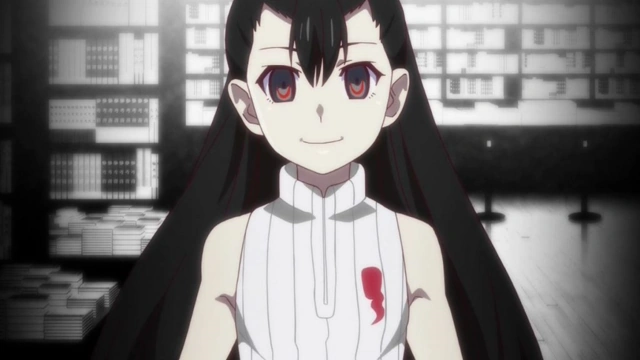
Does Monogatari have an answer to this?
Well… what was the biggest takeaway from the first season again?
“Monogatari pushes that everyone judge everyone else as individuals.”
Alright, this was fun enough writing. I got to do a little bit of stretching…
But yeah, after I complete my analysis of every arc in Monogatari, I plan to bring it all together in a spoiler full in depth argument style post! Doesn’t that sound interesting!?
…
What. It’s just me that thinks that this type of philosophy is exciting? Is it just me that feels like Monogatari is a masterpiece of big brain writing? I didn’t even talk about forgiveness, romance or adolescence, or even the crazily optimistic way in which Monogatari constructs human society that makes me think that there’s real hope out there in the world-
Like wow! I never thought a series could make me feel so full of warmth! While Katanagatari and Medaka Box, also by Nisioisin, provoke similar feelings, I just feel like there’s just this wonderful synergy and genius with Monogatari especially…
The plotting in this series, especially the second season, is just insane. I’ve never seen series that abuse their medium to such consistent and dramatic effect! From the control of chapter numbers in the light novels, to the misleading arc titles in Monogatari Second Season, and even the anime’s use of opening theme songs…
Monogatari is truly special.
I hope you’ll continue to stay with me as I explore some of the many ways in which it is special to me.
So for the Monogatari Opening Analysis series I decided to attempt to follow The Actual Monogatari Watch Order. So far so good. But as a result, we are actually backtracking chronologically to Nekomonogatari: Kuro, which aired after Nisemonogatari but takes place before Bakemonogatari. I believe that’s the case anyways.
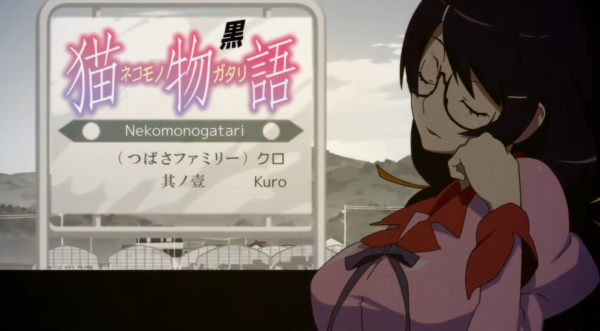
I actually was about halfway through writing the analysis for the Tsubasa Tiger opening when I realized that I hadn’t done Nekomonogatari: Kuro. But it actually worked out well, because the two openings have a lot in common and play off each other. Of course, you’ll have to stay tuned for Monogatari Opening Analysis #10 for that! 🙂
If you missed the last opening analysis, Platinum Disco, you can find it here. I definitely suggest checking it out, if only to listen to the song as it’s the best Monogatari opening song out there.
Now to Perfect Slumbers. It’s a nice song. Very relaxing. Lives up to it’s name for sure. Here you go:
Continue reading “Monogatari Opening Analysis #9 – Perfect Slumbers”
My journey to write THE DEFINITIVE analysis of every part of Monogatari with a strong focus on the characters by using both the anime and original light novels continues!
Hey everyone!
I decided to port my only substantial Monogatari post from my personal blog to EAT Monogatari, where it can be immortalized amongst our other excellent Monogatari analyses and related posts. I originally wrote this post back in November 2017.
Considering this post is from an older part of my blog that might as well not exist, you probably haven’t read this one! It’s a post that I am proud of, as I normally don’t dive as deep into the details as I did here with Kaiki Deishuu. Whenever I get around to re-watching Monogatari for the 3rd time I’ll try and pick another character or two to really dig into like this. 🙂
Anyways, I’ve left the post mostly untouched, with the exception of a few minor changes to the format and text. Enjoy!
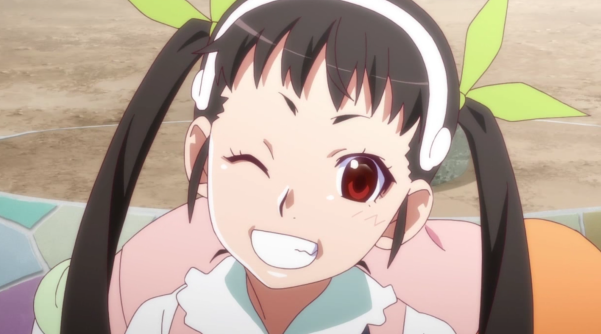
Continue reading “A Comprehensive Analysis of Kaiki Deishuu”
Wow, been a while since either of us posted on EAT Monogatari huh?
Lucky for us, we’ve made it to Monogatari Opening Analysis #8 – Platinum Disco 🙂
The greatest Monogatari opening song of them all! (You can find my list of top Monogatari songs here: Part 1, Part 2, spoiler: Platinum Disco is #1).
Anyways, if you missed the last opening analysis, you can find it here. Karen Bee was an interesting opening, but it was a bit difficult putting everything into words given how disjointed it was. Platinum Disco is a little more straightforward by comparison – it may be the best song, but is it the best opening?
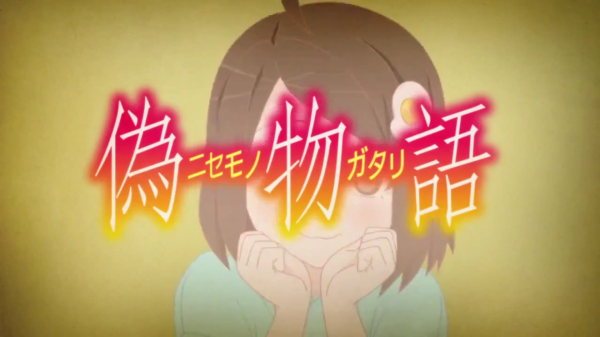
Continue reading “Monogatari Opening Analysis #8 – Platinum Disco”
Zokuowarimonogatari is coming!
And they’re doing theatrical showings this fall…
*sobs uncontrollably*
Another Monogatari event that I’ll miss out on…
Even if I’m low on cash 90% of the time, I would definitely pay to go see Monogatari in the theaters… Okay, maybe not just any Monogatari–
I would rather it not be Kizu 1 or 2, and I really don’t want it to be Tsukimonogatari, but any other part would be great! Monogatari Second Season in theaters would be awesome! That final boss battle, you know the one, would be epic on the big screen!
*wink wink*
But I’m already sad that I didn’t get to see those sweet ‘Madogatari‘ crossover moments!
Like man…
Must be fun to be a Japanese Monogatari fan!
Jealousy aside-
Let’s talk about Zoku Owari real quick-
Pointed statements that will spoil you ahead!
To be quite honest, I’m half elated, and half terrified!
The arc is titled Koyomi Reverse and the trailer talks about mirrors and things being different…
And I’m just hoping that mah boi Shuraragi doesn’t get Koyomimonogatari episode 12‘d again. Like, I’m not enjoying how any time his name is in an arc- he ****! It’s just not fair to my heart…
Honestly, he’s my favorite character of all time, and I just want to see the boy happy…
And that’s also why I’m super excited!
Imagine Hiroshi Kamiya singing an opening theme as Araragi? I mean, his screaming voice is so wonderful, I’m dying to see if they follow through with him doing an OP…
And Araragi aside, look at the hints we have from this arc? A certain rice throwing adult, as well as a certain math loving girl with a haircut…

*double take*
Y’all know what that means! Character development! More catharsis from math girl is definitely welcome!
Also, we might finally get answers about that Izuko Gaen…
And it gets even better!

The one on the left…
Yeeeeeeeeeeeeeees!
SO MUCH YES!
This gives me life! Sengoku Nadeko is easily my third favorite character in the series, and while the blip we saw of her during REDACTED BECAUSE OF SPOILERS, well, it was really heartwarming for me. Like we saw then, she still has her haircut because-
CHARACTER DEVELOPMENT!
Yep, yep, yep! All hail the divine snek!
And uh…
I think that’s it?
I’m just gonna leave a funny picture I found here-
ZOKU HYYYYPE!
The most interesting thing that I’ve learned from over a dozen years of education is how to think.

…
Yes, that’s quite embarrassing sounding, isn’t it? Don’t we all like to act like we’re smart despite other people? But despite that, I’ve always felt enriched by hearing other people’s thought process. That’s probably why my favorite stories lean heavily towards mystery…
But to be abrupt, the worst way to learn is to dive in haphazardly!
For me, the best way to learn has always been to proceed with a few driving questions.

…
So, what does this all have to do with Monogatari? Well, I figured that I would commemorate the revival of my internet by spoiling the center of my creative identity!
The purpose of me writing about Monogatari is never to actually report on what I already know, but to further flesh out and develop my own thoughts on the series. In other words, I use writing to contextualize and learn about this dense series. After all, it’s the single smartest piece of media I’ve ever tried to wrap my head around…
So, here’s a few sample questions, (in no particular order), that I consider when watching and writing about Monogatari!
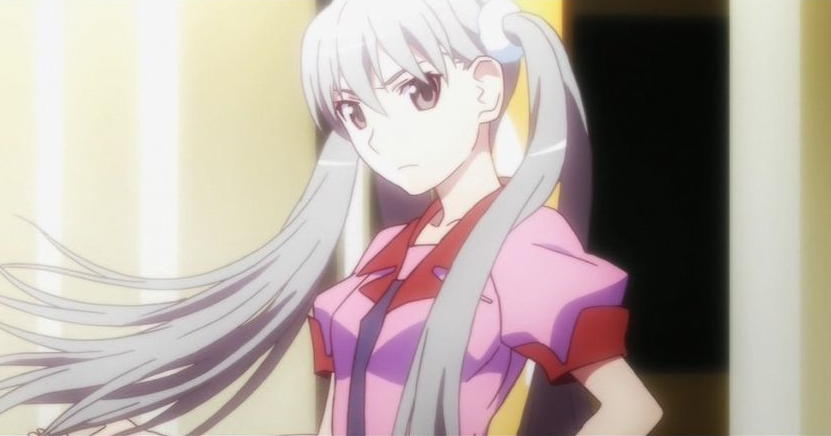


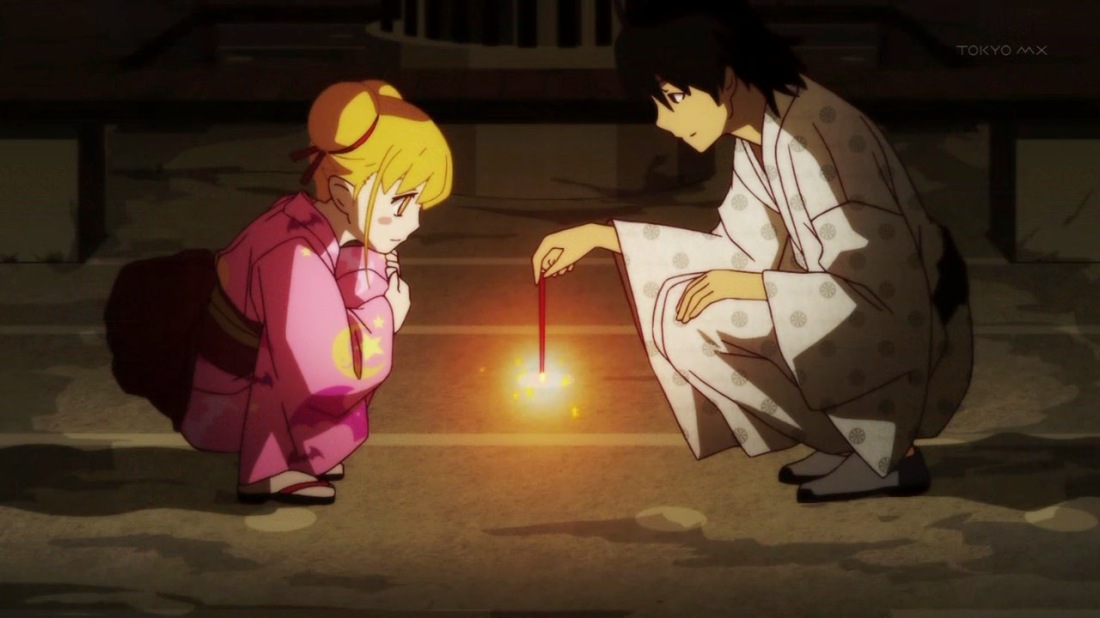

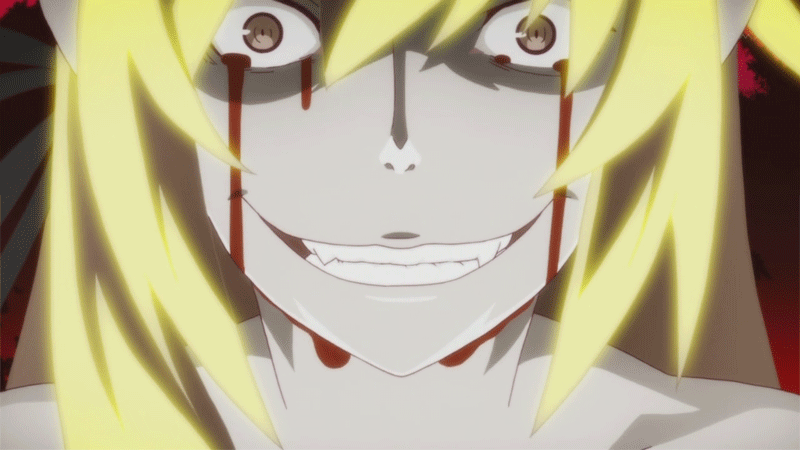
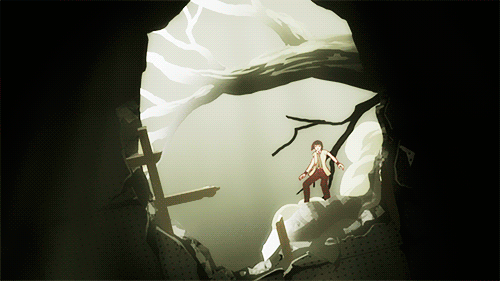
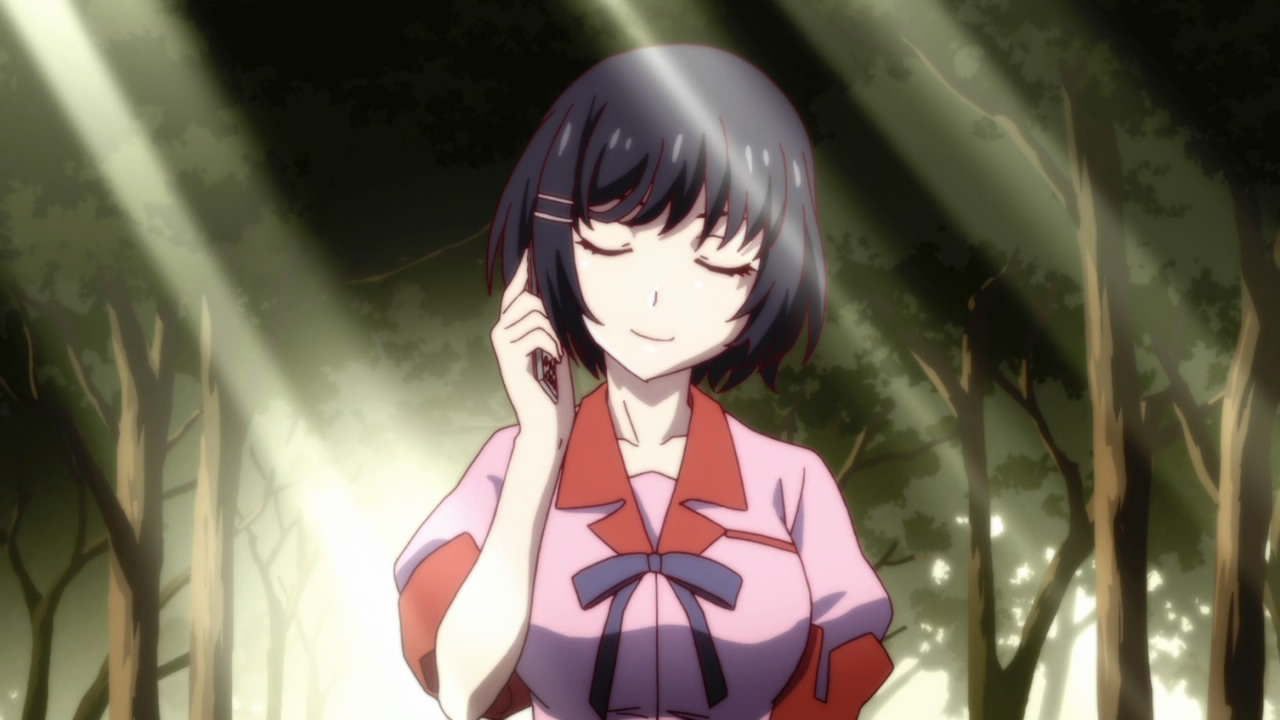


ALRIGHT!
I feel kinda decent about that short-list! Yeah, sure it was definitely rambly! But the secret’s out! That’s my thought process!
Hm…
There’s definitely a strong trend of identity, interaction, perception, and morals? I think that kind of describes my spheres of interest when it comes to Monogatari…
Oh wait, I thought of two more general questions-
Alright. Just wanted to jot them down for future reference…
But yeah, I think there’s a lot of interesting stuff in Monogatari! The depth as well as the breadth of its exploration of the human condition is just really engaging!
Edgy Anime Teen is finally back and working on Monogatari posts-
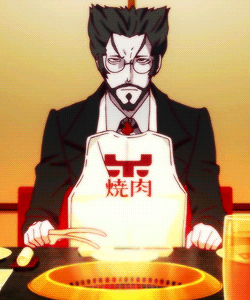
As you can tell, I got a lot of questions I need to answer! Many of which I have already given general conclusions about- but I still hope you’ll join me in further enjoying this wonderful story!
This wonderful Monogatari.
I’m back for another Monogatari Opening Analysis! In case you missed it, you can find the last analysis here.
Marshmellow Justice! Anyone remember this opening? I know I didn’t! Well, I remembered the song but not the actual opening animation. I think the reason for this is that Marshmellow Justice / Karen Bee doesn’t have a lot going on in the animation – or so it seems at first glance. Maybe we will dig up some hidden nuggets of information planted in the opening! You just never know.
I always go into these openings thinking that there isn’t much there, and have been surprised many times now. Let’s see what’s up with Marshmellow Justice!
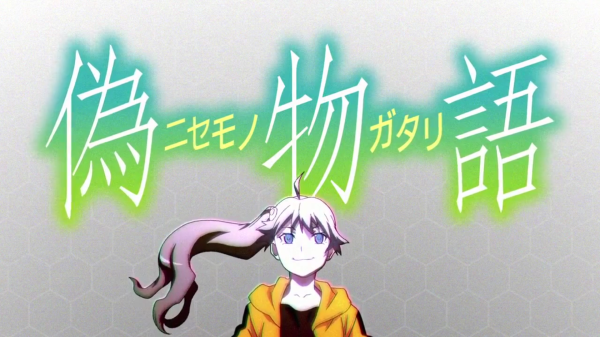
Continue reading “Monogatari Opening Analysis #7 – Marshmellow Justice”